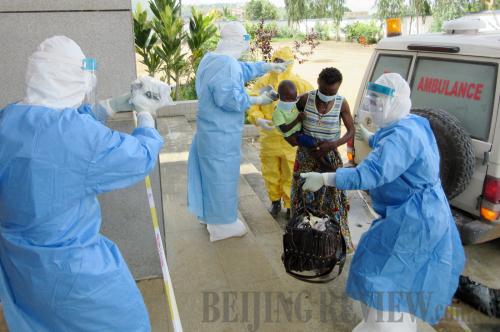|
 |
|
HAZARDOUS WORK: Chinese medical workers usher suspected Ebola patients into a hospital in Freetown, capital of Sierra Leone, on October 11 (XINHUA) |
Following a succession of confirmed secondary infection cases of Ebola out of the African continent, the deadly virus is more likely to constitute a global crisis. By October 21, three medical workers—two in the United States and one in Spain—had contracted the disease after treating patients from Africa in their hospitals.
Talking on the phone on October 14, U.S. President Barack Obama and UN Secretary General Ban Ki-moon stressed the urgent need for the international community to take concrete measures "to provide the personnel, equipment and supplies required to stop the epidemic at its source."
An underestimated risk
Since the outbreak of the Ebola epidemic in February, more than 4,800 people had died of the disease in three hardest-hit countries of Guinea, Liberia and Sierra Leone, according to the World Health Organization (WHO) on October 19. Furthermore, the epidemic appears to be outpacing efforts to fight it.
Reports from Xinhua News Agency said that in Monrovia, capital of Liberia, no one shakes hands, while an elbow bump is used sparingly for greetings, with most people preferring not to make any physical contact at all. Radio stations are airing popular songs about Ebola, and conversations between locals are largely dominated by Ebola-related news. Local people are also taking a highly cautious approach to handling dead bodies.
Prior to the latest outbreak, the Ebola epidemic had mainly been confined to Africa. The virus therefore did not arouse adequate attention until it recently invaded Europe and North America. The neglect occurred in part because Ebola is highly infectious with a high fatality rate and a short incubation period, which reduces its risk of far-distance spreading. For the past four decades, most victims of the virus have been Africans, leaving the international community largely unwilling to devote the significant amount of funds needed to research and develop vaccines.
Tao Yong, a consultant for Chinese e-magazine Far & Wide Journal and a long-term observer of African issues, said that since the Ebola virus was discovered in Africa about 40 years ago, it has long been seen as a local albeit malignant disease. Thus most developed countries with the ability to develop vaccines or specific medicines showed little interest in doing so—an attitude suggesting it was "none of their business," commented Tao, who has lived in Africa for a long time.
Though some volunteers, international and non-governmental organizations have made laudable efforts in fighting the disease, their endeavors appeared weak in face of the relentless epidemic.
When the epidemic first broke out this year in West Africa, most countries kept a wait-and-see attitude, leaving the vulnerable African countries to fend for themselves. Only the Economic Community of West African States allocated $250,000 for Ebola virus treatment in the region. Due to the lack of funding, only 18 percent of Ebola patients in Liberia are being cared for in hospitals or other settings that reduce the risk of transmission by isolating them from the rest of the population. Most countries merely took measures such as monitoring travelers' movements and issuing travel advisories.
Although President Obama warned previously that if the United States didn't act there could be a long-term threat to homeland security, the country seemed ill-prepared to deal with the virus.
| 